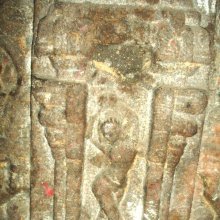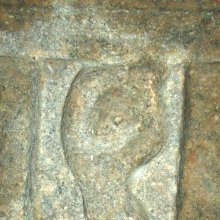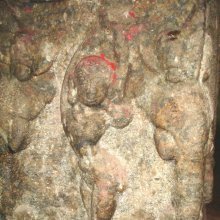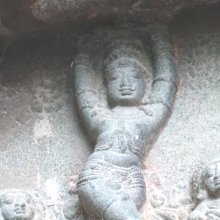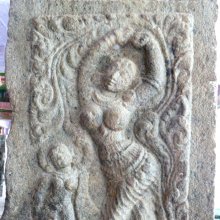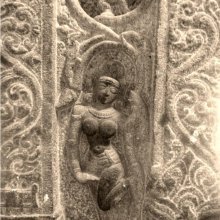Parivritta, Parivṛtta, Parivṛttā: 16 definitions
Introduction:
Parivritta means something in Hinduism, Sanskrit, Hindi. If you want to know the exact meaning, history, etymology or English translation of this term then check out the descriptions on this page. Add your comment or reference to a book if you want to contribute to this summary article.
The Sanskrit terms Parivṛtta and Parivṛttā can be transliterated into English as Parivrtta or Parivritta, using the IAST transliteration scheme (?).
Images (photo gallery)
(+14 more images available)
In Hinduism
Natyashastra (theatrics and dramaturgy)
Source: Wisdom Library: Nāṭya-śāstra1) Parivṛtta (परिवृत्त).—One of the 108 karaṇas (minor dance movement) mentioned in the Nāṭyaśāstra chapter 4. The instructions for this parivṛtta-karaṇa is as follows, “the hands raised in Apaveṣṭita gesture, the feet in Sūcī position, the Trika is turned round (in the Bhramarī Cārī).”.
A karaṇa represents a minor dance movements and combines sthāna (standing position), cārī (foot and leg movement) and nṛttahasta (hands in dancing position).
2) Parivṛtta (परिवृत्त, “turned back”) refers to a specific gesture (āṅgika) made with the shank (jaṅghā), according to the Nāṭyaśāstra chapter 10. These gestures form a part of the histrionic representation (abhinaya).
Source: archive.org: The mirror of gesture (abhinaya-darpana)One of the hasta-prāṇa, or ‘Twelve Lives of the Hands’: Parivṛtta (turned round): the hand directed forwards, sideways.
Source: archive.org: Natya ShastraParivṛtta (परिवृत्त, “turned back”).—A type of gesture (āṅgika) made with the shank (jaṅghā);—Instructions: the turning back [of a shank]. Uses: in Class Dance and the like.
Source: Shodhganga: Elements of Art and Architecture in the Trtiyakhanda of the Visnudharmottarapurana (natya)Parivṛtta (परिवृत्त) refers to one of the 108 kinds of Karaṇa (“coordination of precise movements of legs and hands”), according to the Viṣṇudharmottarapurāṇa, an ancient Sanskrit text which (being encyclopedic in nature) deals with a variety of cultural topics such as arts, architecture, music, grammar and astronomy.—According to the Viṣṇudharmottarapurāṇa, karaṇas are the coordination of precise movements of legs and hands performed in a particular posture. The Nāṭyaśāstra also gives its view point in the same spirit. In the Viṣṇudharmottarapurāṇa, one hundred and eight kinds of karaṇas are accepted, e.g., Parivṛtta.

Natyashastra (नाट्यशास्त्र, nāṭyaśāstra) refers to both the ancient Indian tradition (shastra) of performing arts, (natya—theatrics, drama, dance, music), as well as the name of a Sanskrit work dealing with these subjects. It also teaches the rules for composing Dramatic plays (nataka), construction and performance of Theater, and Poetic works (kavya).
Purana and Itihasa (epic history)
Source: Cologne Digital Sanskrit Dictionaries: The Purana IndexParivṛttā (परिवृत्ता).—A daughter of Ṛṣā brought forth oyster, conch, aiṇeya, śambūka and different kinds of poison like Kālakūṭa.*
- * Brahmāṇḍa-purāṇa III. 7. 414, 419-20; Vāyu-purāṇa 69. 291, 296.

The Purana (पुराण, purāṇas) refers to Sanskrit literature preserving ancient India’s vast cultural history, including historical legends, religious ceremonies, various arts and sciences. The eighteen mahapuranas total over 400,000 shlokas (metrical couplets) and date to at least several centuries BCE.
Ayurveda (science of life)
Agriculture (Krishi) and Vrikshayurveda (study of Plant life)
Source: Shodhganga: Drumavichitrikarnam—Plant mutagenesis in ancient IndiaParivṛtta (परिवृत्त) [or parivṛtti?] refers to “modification (of flowers or fruits)” which represents one of the bio-organic agricultural methods described in the Vṛkṣāyurveda by Sūrapāla (1000 CE): an encyclopedic work dealing with the study of trees and the principles of ancient Indian agriculture.—Accordingly, “Several special processes with reference to the plants will be described hereunder. They are: [e.g., changing (parivṛtta) the flowers and changing the fruits (puṣpaparivṛttiphalānyatā);] and so on. [...]”.

Āyurveda (आयुर्वेद, ayurveda) is a branch of Indian science dealing with medicine, herbalism, taxology, anatomy, surgery, alchemy and related topics. Traditional practice of Āyurveda in ancient India dates back to at least the first millenium BC. Literature is commonly written in Sanskrit using various poetic metres.
Languages of India and abroad
Sanskrit dictionary
Source: DDSA: The practical Sanskrit-English dictionaryParivṛtta (परिवृत्त).—p. p.
1) Revolved, turned round; °अर्धमुखी (ardhamukhī) V.1.19.
2) Retreated, turned back.
3) Exchanged, bartered.
4) Finished, ended.
-ttam An embrace.
Source: Cologne Digital Sanskrit Dictionaries: Shabda-Sagara Sanskrit-English DictionaryParivṛtta (परिवृत्त).—mfn.
(-ttaḥ-ttā-ttaṃ) 1. Gone round, revolved. 2. Turned back, retreated, retired. 3. Exchanged. 4. Finished, ended. n.
(-ttaṃ) An embrace. E. pari before, vṛt to be, aff kta.
Source: Cologne Digital Sanskrit Dictionaries: Cappeller Sanskrit-English DictionaryParivṛtta (परिवृत्त).—[adjective] rolling ([neuter] as subst.), turned or spread round, lasting, finished, ended, gone; bhāgya unfortunate (lit. whose fortune has gone).
Source: Cologne Digital Sanskrit Dictionaries: Monier-Williams Sanskrit-English Dictionary1) Parivṛtta (परिवृत्त):—[=pari-vṛtta] [from pari-vṛt] mfn. (also -ka [gana] ṛśyādi) turned, turned round, revolved, rolling, moving to and fro, [Mahābhārata; Kāvya literature] etc.
2) [v.s. ...] lasting, remaining, [Śakuntalā vii, 34] ([varia lectio])
3) [v.s. ...] passed, elapsed, finished, ended, [Harivaṃśa]
4) [v.s. ...] = pari-vṛta, covered, surrounded, [cf. Lexicographers, esp. such as amarasiṃha, halāyudha, hemacandra, etc.]
5) [v.s. ...] retreated, returned, [Horace H. Wilson]
6) [v.s. ...] exchanged, [ib.]
7) [v.s. ...] n. rolling, wallowing, [Mahābhārata] ([varia lectio] tti), [Mālatīmādhava]
8) [v.s. ...] an embrace, [Monier-Williams’ Sanskrit-English Dictionary]
Source: Cologne Digital Sanskrit Dictionaries: Yates Sanskrit-English DictionaryParivṛtta (परिवृत्त):—[pari-vṛtta] (ttaḥ-ttā-ttaṃ) a. Gone round or back; exchanged; finished.
Source: DDSA: Paia-sadda-mahannavo; a comprehensive Prakrit Hindi dictionary (S)Parivṛtta (परिवृत्त) in the Sanskrit language is related to the Prakrit words: Pariatta, Parimia.
[Sanskrit to German]
Sanskrit, also spelled संस्कृतम् (saṃskṛtam), is an ancient language of India commonly seen as the grandmother of the Indo-European language family (even English!). Closely allied with Prakrit and Pali, Sanskrit is more exhaustive in both grammar and terms and has the most extensive collection of literature in the world, greatly surpassing its sister-languages Greek and Latin.
Hindi dictionary
Source: DDSA: A practical Hindi-English dictionaryParivṛtta (परिवृत्त):—(a) revolved; changed; hence ~[vṛtti] (nf).
...
Kannada-English dictionary
Source: Alar: Kannada-English corpusParivṛtta (ಪರಿವೃತ್ತ):—
1) [adjective] turned; gone round; revolved.
2) [adjective] bent backward or inward.
3) [adjective] surrounded; encircled.
4) [adjective] that is circular or round in shape.
5) [adjective] finished; completed; ended.
6) [adjective] exchanged; bartred.
--- OR ---
Parivṛtta (ಪರಿವೃತ್ತ):—
1) [noun] (rhet.) irregular repetition, in the same stanza, of words or syllables similar in sound but different in meaning.
2) [noun] (dance.) an attaining of the attitude with palms brought near and turned upwards, feet placed close to each other with the heel of one raised up, and then turning on the virtical axis of the body.
Kannada is a Dravidian language (as opposed to the Indo-European language family) mainly spoken in the southwestern region of India.
Nepali dictionary
Source: unoes: Nepali-English DictionaryParivṛtta (परिवृत्त):—adj. 1. revolved; turned; 2. exchanged; bartered; 3. retreated; turned back; 4. surrounded; covered;
Nepali is the primary language of the Nepalese people counting almost 20 million native speakers. The country of Nepal is situated in the Himalaya mountain range to the north of India.
See also (Relevant definitions)
Partial matches: Vritta, Pari.
Starts with (+2): Parivrittabhagya, Parivrittaikapadashirshasana, Parivrittajanushirshasana, Parivrittaka, Parivrittakarechita, Parivrittakarecita, Parivrittamberu, Parivrittanabhi, Parivrittanetra, Parivrittaparshvakonasana, Parivrittapashchimottanasana, Parivrittapashcimottanasana, Parivrittaphala, Parivrittardhacandrasana, Parivrittardhachandrasana, Parivrittarechita, Parivrittarecita, Parivrittasiddhasana, Parivrittate, Parivrittatejas.
Ends with: Samparivritta, Suparivritta, Uparivritta.
Full-text: Parimia, Parivrittanetra, Parivrittatejas, Parivrittabhagya, Parivrittaphala, Pariatta, Parivrittasiddhasana, Parivrittapashcimottanasana, Parivrittaparshvakonasana, Parivrittopavishtakonasana, Parivrittardhacandrasana, Parivrittajanushirshasana, Parivrittatrikonasana, Parivrittaikapadashirshasana, Abhisavrit, Jangha, Parivritti, Hasta-prana, Val, Vrit.
Relevant text
Search found 11 books and stories containing Parivritta, Pari-vritta, Pari-vṛtta, Pari-vrtta, Parivṛtta, Parivṛttā, Parivrtta; (plurals include: Parivrittas, vrittas, vṛttas, vrttas, Parivṛttas, Parivṛttās, Parivrttas). You can also click to the full overview containing English textual excerpts. Below are direct links for the most relevant articles:
Sahitya-kaumudi by Baladeva Vidyabhushana (by Gaurapada Dāsa)
Text 7.98 < [Chapter 7 - Literary Faults]
Text 7.84 < [Chapter 7 - Literary Faults]
Text 7.100 < [Chapter 7 - Literary Faults]
Gati in Theory and Practice (by Dr. Sujatha Mohan)
Gati pertaining to conditions and situations < [Chapter 3 - Application of gati in Dṛśya-kāvyas]
Gati pertaining to Characters < [Chapter 3 - Application of gati in Dṛśya-kāvyas]
Gait identified in the martial arts of India < [Chapter 4 - Practice of Gati]
Abhinaya-darpana (English) (by Ananda Coomaraswamy)
Natyashastra (English) (by Bharata-muni)
Chapter X - Gestures of other Limbs
Chapter IV - Description of the Class Dance (tāṇḍava)
Vishnudharmottara Purana (Art and Architecture) (by Bhagyashree Sarma)
2.5. Karaṇa (movements of legs and hands) < [Chapter 3 - Drama and Dance]
Nitiprakasika (Critical Analysis) (by S. Anusha)
Sarga V: Amuktāyudha-nirūpaṇa (51 Verses) < [Chapter 2]
